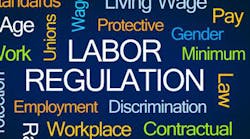Is your dental office at risk for an FLSA lawsuit?
3 easy ways to help your practice comply with labor laws
The health-care industry has been hit with more than 16,000 successful Fair Labor Standards Act (FLSA) wage and hour prosecutions by the U.S. Department of Labor since 1985. That's about 516 prosecutions each year, 10 each week, and two each business day.(1) Dental offices are responsible for nearly 900 of those prosecutions, and they've handed over more than $4 million in fines over the past two decades alone.(1)
If those numbers don't scare you, consider this: FLSA lawsuits brought privately by attorneys acting independently of the Department of Labor are up more than 456% since 1995. They are at record levels, and experts predict that these numbers will only continue to rise.
Why? Well, thanks to the DOL's new overtime rule, at least 4.2 million employees who were once considered exempt from overtime pay will now qualify for it starting December 1, 2016. Some say that number could jump to 12 million. While the update is expected to play a big role in wage and hour lawsuits in 2017 and beyond, the number one reason these types of lawsuits increase is simply because employers continue to violate long-standing aspects of the FLSA.
RELATED ARTICLES:New FLSA overtime rules and what they mean for your dental practice
DOL issues Final Rule regarding overtime pay under Fair Labor Standards Act
However, in most cases they do so unknowingly. For example, did you know that paying a non-exempt employee a bonus can trigger an FLSA lawsuit?(2) Or that an employee working through a lunch break can result in a costly prosecution? Unfortunately, ignorance is not an alibi and dental offices are especially prone to making FLSA mistakes. This is because many dental practitioners, while extremely well versed in the world of dentistry, rarely cover the intricacies of labor law at dental school. Managing employees, running payroll, and complying with the FLSA aren't topics usually covered.
"There’s never been a better time to analyze your policies and make a habit of compliance,” says Maria O. Hart, employment law attorney at Parsons Behle & Latimer.(2) Now is the time to examine your dental practice and ensure you aren't unknowingly making any serious or costly mistakes. To start, ask yourself a few questions.
Are your employees correctly classified as exempt or nonexempt?
As of December 1, 2016, if an employee makes less than $47,467 per year, they could be entitled to overtime pay, even if they're salaried. But for dental practitioners, this seemingly simple rule becomes a bit more complex because it hinges on what it known as the "job duties" test.
"The FLSA exempts those who qualify as 'learned professionals' from the minimum wage and overtime requirements," said Curtis Summers and Robert Rojas of Husch Blackwell LLP. "It should come as no surprise that dentists, doctors, optometrists, and other physician specialists qualify for the exemption. However, whether the exemption applies to dental hygienists is not as clear."(3)
According to Summers and Rojas, dental hygienists qualify as exempt only "if they have successfully completed four academic years of pre-professional and professional study in an accredited college or university approved by the Commission on Accreditation of Dental and Dental Auxiliary Education Programs of the American Dental Association."(3)
Without that accreditation, a hygienist cannot be labeled as exempt. So, before classifying a dental hygienist as exempt, it is incumbent upon dentists to ensure their hygienists have obtained the required accreditation.(3)
Unfortunately, misclassifying an employee, no matter how innocently, puts your practice at risk for an FLSA lawsuit. In fact, more than 80% of FLSA lawsuits are overtime related.(1)
Do you have accurate and easily accessible employee records?
You know how important it is to keep accurate patient records on hand. But did you know that the FLSA has specific recordkeeping requirements for both exempt and nonexempt employees? "Payroll records must be retained for a period of three years while other employment information and earnings records must be retained for at least two years," said Summers and Rojan.(3)
Not only are those records important to have on hand for your own benefit, they could serve as your number one defense in the event that your practice gets hit with a wage and hour lawsuit.
If you're picturing a filing cabinet stuffed with handwritten forms and thinking you're in the clear, keep in mind that those records must be made available for inspection within 72 hours of any request from the DOL.(3) In other words, if you do get hit with a lawsuit, you've got 72 hours to produce your number one and in some cases only defense. Long story short, if you're still using Excel or paper processes, you're putting yourself at risk.
Are you up-to-date on DOL and FLSA regulations?
The Department of Labor recently agreed to pay more than $7 million to settle a lawsuit filed against it by its own employees that claimed the DOL was violating the FLSA, the very statute the DOL is tasked with enforcing.(4) If the DOL can make a $7 million mistake regarding the FLSA, you can too.
"A dispute with the DOL or a group of employees doesn't mean you're a bad employer," said Daniel Abrahams, a partner with Brown Rudnick LLP. "It just means that you ran afoul of some very complicated rules."(2) Paul DeCamp, an attorney with Jackson Lewis, agrees. "If the DOL can't get this right, what chance do other employers have?"(5)
Unfortunately, most dentists don't realize how complicated the FLSA can be, according to Summers and Rojan. As a result, they do not believe their offices present significant risk of violation.(3) But the numbers tell a different story.
Nearly 900 dental offices have been hit with a DOL prosecution over the past 30 years and, by its own admission, these have been for the more egregious violations. For the rest, there's no shortage of attorneys ready to file lawsuits. It happened to them, and it can just as easily happen to you.(1) If you're not familiar with your obligations under the FLSA and how they interact with state labor laws, you're at risk.
3 things to do right now to help prevent an FLSA lawsuit
1. Create and enforce a company policy—“Everything comes back to having a rock-solid policy,” said Hart, "I can't emphasize that enough."(2) If you want to protect yourself against wage and hour lawsuits, having an official, written policy, one that meets the strict requirements of both the federal and the state law, is non-negotiable. "It needs to set clear expectations," says Hart. It should detail exactly when employees are authorized to work overtime, how they're expected to track their time, when they're expected to take breaks, and more. "If the policy is super complicated, it might be worth it to invest in an attorney to help you craft it," says Hart. A compliant and clear company policy serves as a strong defense against wage and hour lawsuits.(2)
However, a written policy, no matter how clear, "Does not protect the business if the business does not implement the policy uniformly, if it only applies to certain employees or only when it's convenient," says Hart. "You should periodically take a good hard look at whether or not your policy is being implemented."(2)
2. Refresh yourself on DOL and state regulations—“The Federal law is one thing,” says Hart, “but it’s the minimum. Each state is well within its authority to create a more robust law. Business owners need to be aware and up-to-date on both.”(2) Failing to stay current on DOL or state regulations means failing to understand what's expected from you as a practice owner, which can easily result in FLSA lawsuits. “The FLSA’s wage and hours provisions are a complicated, shifting target," says Abrahams, a fact made evident by the DOL's failure to comply with them. "The law is being reinterpreted in new ways all the time through court rulings, making it very difficult to stay on top of every nuance in real time."(2)
He suggests asking your HR team to keep an ear to the ground when it comes to pivotal court cases in your industry, and enlist legal counsel to help you stay abreast of changes that may impact you.(2) Employment attorney Lee Schreter with Littler Mendelson adds, "Make sure [you] have the mandatory posters up in the workplace, and make sure those posters are up-to-date. This is one of the easiest things to do to stay up-to-date with DOL regulations and avoid wage and hour lawsuits," she says.(2)
3. Start tracking employee time, even for salaried employees—“From a legal perspective, all I look for is that the business has a consistent way to track and record hours," Hart says.(2) Automated time tracking gives employers valuable business insight that allows them to accurately classify employees, regulate overtime hours, and consistently track breaks or after-hours work.(6) “Employees need to track their hours so they know what they’re entitled to,” Hart adds.(2)
When it comes to the FLSA, being able to prove exactly when your employees worked and how much they were paid can be a critical defense against wage and hour lawsuits. If you want to protect yourself, your practice, and your employees, you’ve got to add accurate record keeping to the top of your list, and start immediately. "To the degree that you don't have this in place, at the very least start creating a really good paper trail," Hart said. It could be your strongest defense.(2)
For the most current dental headlines, click here.
References
1. FLSA Wage and Hour Lawsuits are up 456 percent. TSheets. https://www.tsheets.com/flsa-research-tool. Published August 2016. Accessed 2016.
2. Hart MO, Abrahams D, Schreter L. What You Need to Know About FLSA Wage And Hour Lawsuits. https://www.tsheets.com/resources/flsa-wage-hour-lawsuits. Published August 2016. Accessed 2016.
3. Summers CR, Rojas RJ. Top 5 FLSA/Wage and Hour Pitfalls Affecting Dentists. Legal Comments. 2015. http://www.huschblackwell.com/~/media/files/businessinsights/businessinsights/2015/02/article_focus_summers_rojas_jan2015.pdf. Accessed 2016.
4. Kauffman K. AFGE and US Department of Labor Settle Multi-Million Dollar Overtime Grievance. AFGE Local 12. http://www.afgelocal12.com/overtimecase/afge local 12 department of labor settlement press release 8-12-2016.pdf. Published August 12, 2016. Accessed 2016.
5. Nagele-Piazza L. US Department of Labor Settles Its Own Decade-Long Overtime Battle For $7M. Society For Human Resource Management. https://www.shrm.org/resourcesandtools/legal-and-compliance/employment-law/pages/labor-department-wage-settlement.aspx. Published August 23, 2016. Accessed 2016.
6. Tracking Time for FLSA Compliance. https://www.tsheets.com/flsa-compliance. Published August 2016. Accessed 2016.

